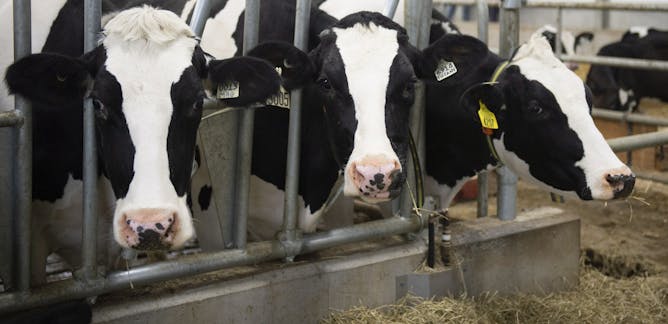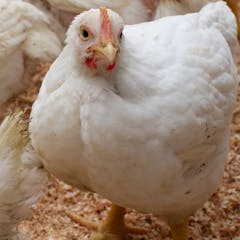
Articles on Poultry
Displaying 1 - 20 of 32 articles

Bird flu in U.S. dairy cows has Canadian public health experts on high alert. With one human case identified in Texas, what is the likelihood of H5N1 influenza moving from birds to mammals to people?

People should minimise contact with birds in areas affected by bird flu viruses, including farms and settings where live animals may be sold or slaughtered.

Keeping guests safe involves far more than just careful cooking − hand-washing, keeping work surfaces clean, safe handling and proper storage are also key ingredients.

South Africa’s biosecurity breaches signal capacity challenges in farm biosecurity measures and the country’s veterinary and related support services.

New and innovative thinking is needed to deal with the reality on the ground in South Africa.

Tracking data suggests individual chickens have very different movement patterns.

Avian influenza — commonly known as ‘bird flu’ — is infecting domestic and wild birds in Canada and around the world.

Bird flu has been recurring in Africa since 2006 and Nigeria is heavily affected. High-level biosecurity measures are required to keep people and animals safe.

Avian influenza viruses have evolved to infect birds, but the current H5N1 outbreak is also infecting a wide range of mammals. This suggests that it could mutate into forms that threaten humans.

Indiscriminate antimicrobial use in Nigeria’s poultry value chain is putting people at risk of developing resistance to medicines.

Avian influenza virus — or bird flu — can infect domestic poultry such as chickens and turkeys, as well as wild birds. The H5N1 strain has been identified in Canada.

From ‘turkey trot’ to ‘going cold turkey,’ the centerpiece to many Thanksgiving dinners has lent its name to many things. But it also borrowed its name from elsewhere.

African livestock keepers need help: without proactive interventions, increasing temperatures will reduce meat and milk production.

Insect farming is growing in popularity as an alternative to traditional livestock and feed production. A scholar evaluates what that means in terms of trillions of insect lives.

Egg production standards are about more than just a happy compromise. Hens are sentient, intelligent beings. Like us, they deserve a good life.

Thousands of workers at meat- and poultry-processing plants have contracted COVID-19, and hundreds have died. A legal scholar recommends ways to make their jobs safer.

More than half the US production of broiler chickens is in states along the coast frequently struck by hurricanes.

Victoria currently has three avian influenza outbreaks across six farms. They are being treated as an emergency. Here’s how authorities are responding.

Amid the COVID-19 pandemic, some critics say livestock farms promote diseases that spread from animals to humans. An animal scientist explains how well-run farms work to keep that from happening.

COVID-19 outbreaks have occurred at more than 100 US meatpacking plants. Geography, workforce demographics and economic concentration make it hard for workers to fight for better conditions.





